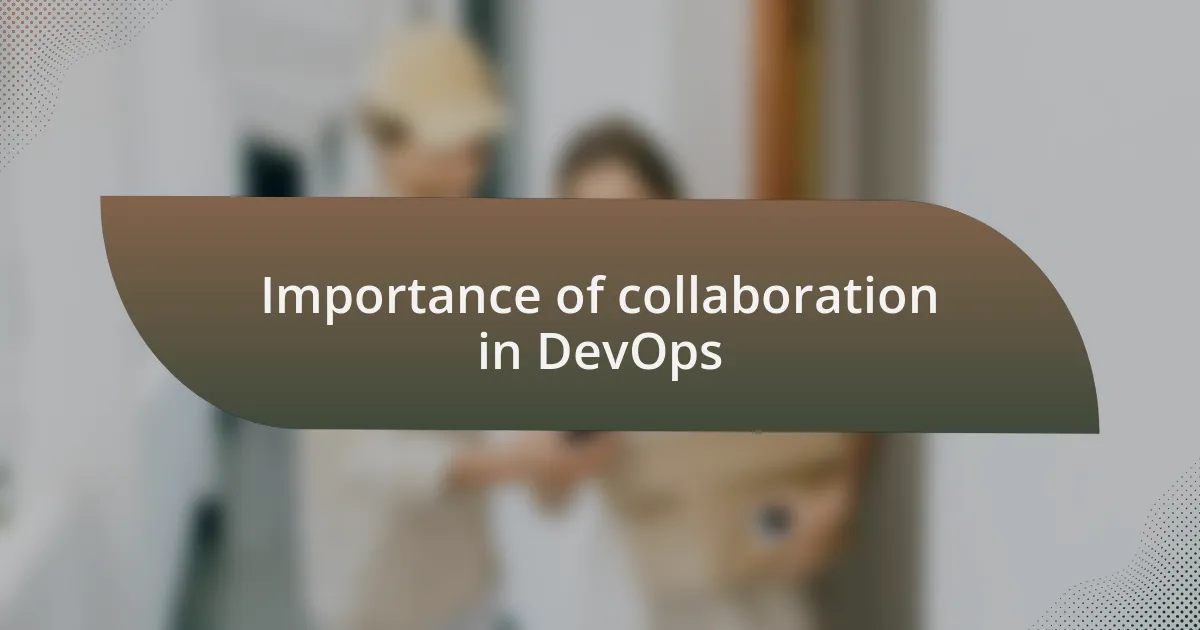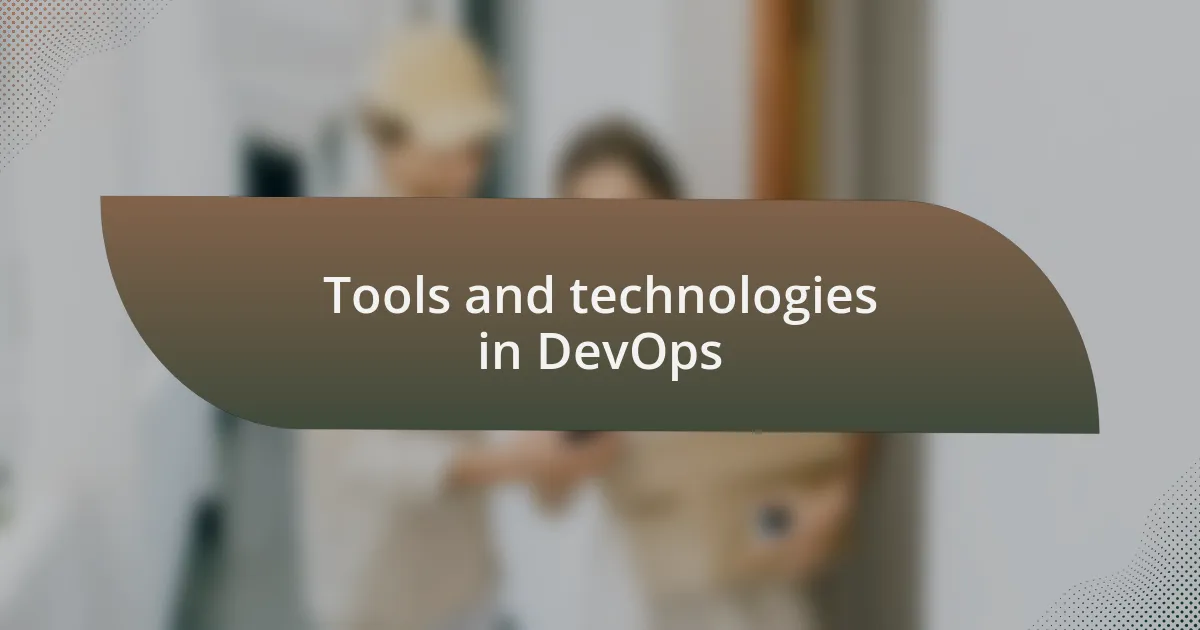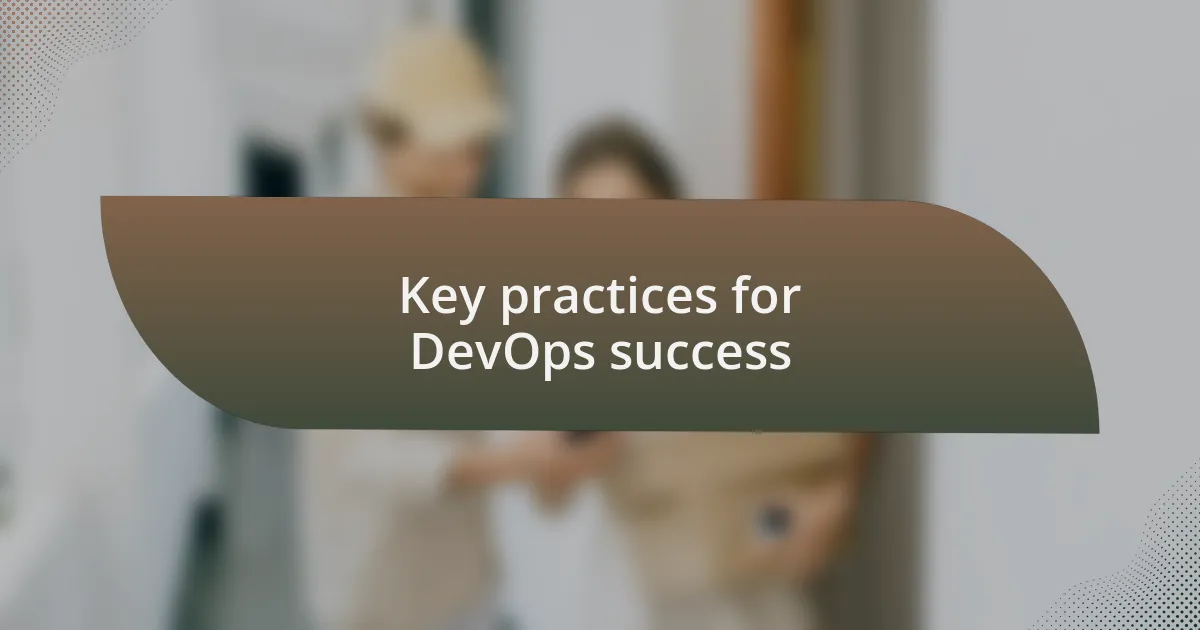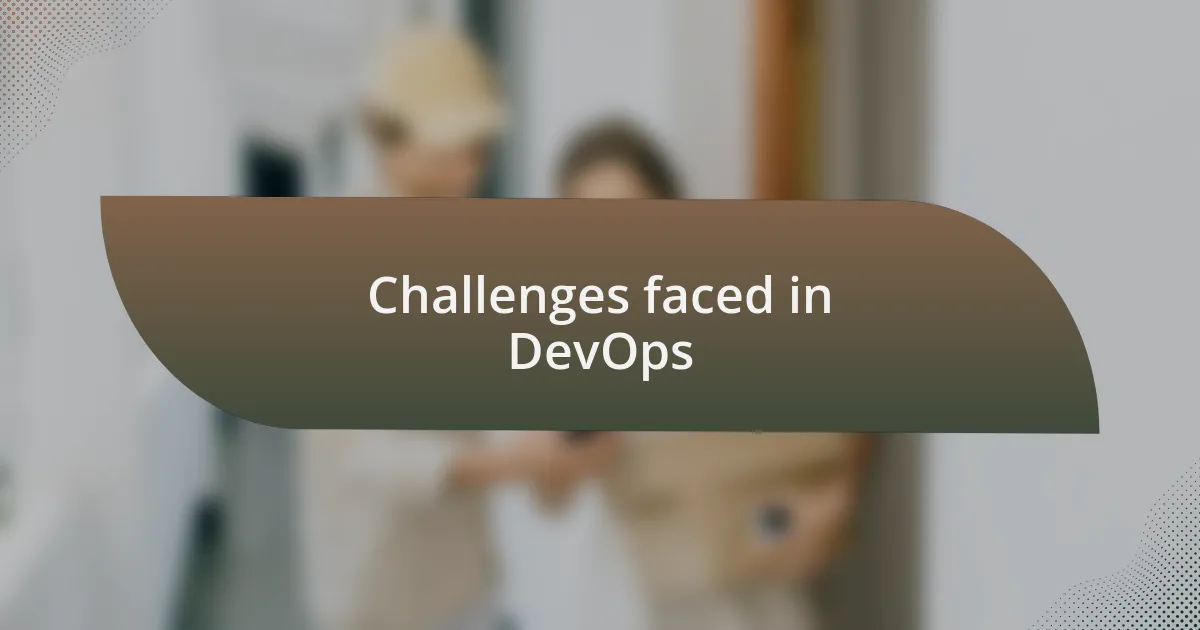Key takeaways:
- DevOps principles emphasize collaboration between development and operations teams, enhancing communication and creativity.
- Embracing automation streamlines processes, reduces errors, and allows faster and more reliable deployments.
- Effective communication and a culture of feedback are crucial for continuous improvement and project success.
- Future goals include leveraging cloud-native technologies, incorporating machine learning, and fostering an inclusive team culture for enhanced innovation.

Understanding DevOps principles
Understanding DevOps principles is like uncovering a new layer in software development that truly changes the way teams collaborate. I remember my first encounter with the concept of continuous integration; it felt revolutionary. The idea that we could automate the testing and integration of code changes meant fewer deployments failed and, ultimately, more time to innovate. How liberating is that to think about?
Another key principle is the focus on collaboration between development and operations teams. In my early days, I had a very rigid view of these roles. It took a team-building exercise for me to realize the immense value of sharing perspectives. When developers and operations staff work together, we not only accelerate delivery but also foster an environment that encourages creativity and problem-solving. Doesn’t it make you wonder how much simpler challenges could become with better communication?
The culture of feedback is another cornerstone that I’ve come to appreciate deeply in my DevOps journey. Early on, I was hesitant to share my mistakes or seek feedback. But, as I learned to embrace failure as a part of growth, I started viewing feedback as a treasure trove for improvement. It’s fascinating to think about how constructive criticism can lead to innovation and efficiency—doesn’t that shift your perspective on how we view setbacks?

Importance of collaboration in DevOps
Collaboration in DevOps is more than just a buzzword; it’s about breaking down silos that often hinder progress. I recall a project where our team faced a critical deadline. Instead of operating in our usual isolated ways, we decided to hold daily stand-ups. That small shift promoted open communication, allowing everyone to share insights and resolve issues on the spot. The result? We not only met the deadline but also delivered a product that exceeded expectations. Isn’t it amazing how a little collaboration can lead to significant breakthroughs?
In my experience, collaboration fosters a culture of trust and mutual respect. Reflecting on past projects, I’ve noticed that when team members feel safe sharing their ideas and concerns, the quality of our work improves. I remember a colleague hesitating to voice an opinion during a project review. Once we encouraged her to speak up, her innovative ideas transformed our approach. Wouldn’t you agree that creating a safe space for dialogue is essential for unlocking potential?
Moreover, collaborative efforts in DevOps lead to a shared responsibility for both successes and setbacks. I’ve seen teams that embrace this philosophy thrive, as everyone feels invested in the outcome. When one part of the pipeline encounters an issue, the entire team rallies to address it. This spirit of unity not only enhances problem-solving but also builds camaraderie among the group. Have you ever felt that sense of achievement when the whole team pulls together? It truly reinforces the notion that we are stronger together.

Tools and technologies in DevOps
When it comes to tools and technologies in DevOps, my toolbox has evolved significantly over the years. I remember the first time I was introduced to Docker; it transformed how I approached application deployment. The ability to package software into containers allowed me to work seamlessly across different environments, making the process not only faster but also more reliable. Have you ever experienced that ‘aha’ moment when a tool perfectly fits your needs?
Another essential technology I’ve grown fond of is Jenkins. This automation server has been a game-changer for continuous integration and continuous delivery (CI/CD) in my projects. When I first implemented it, I was amazed at how it streamlined our testing and deployment phases. It felt like our workflow accelerated overnight. Isn’t it fascinating how the right tool can turn hours of manual tasks into a few clicks?
I can’t overlook the importance of monitoring and logging tools, such as Prometheus and Grafana. Early on in my DevOps journey, I encountered a production issue that we struggled to diagnose. After integrating Grafana for real-time monitoring, I found not only the root cause of the problem but also a wealth of data to prevent future issues. Have you ever felt relieved when you pinpoint an issue only because you had the right monitoring in place? These tools provide peace of mind and empower teams to proactively manage their systems.

Key practices for DevOps success
Embracing automation has been a cornerstone of my DevOps journey. I vividly recall the early days when manual deployments consumed entire afternoons, leaving me exhausted. Introducing automation scripts not only saved time but also reduced human error, transforming chaotic releases into coordinated efforts. Can you imagine the relief of running a script and watching everything fall into place?
Collaboration between development and operations teams is crucial for DevOps success. I remember implementing regular stand-up meetings that fostered open communication. It was an eye-opener when I saw developers and operations professionals work hand-in-hand to tackle issues. Have you ever witnessed the shift in project dynamics when silos break down? The shared ownership significantly improved our problem-solving skills and ultimately enhanced team morale.
Another key practice is continuously measuring and learning from our processes. I often use metrics to identify bottlenecks, and one instance revealed that our testing phase was longer than necessary. By analyzing the data and making adjustments, we streamlined our workflow, leading to faster releases. Isn’t it fascinating how data-driven decisions can create tangible improvements in our work? This mindset of continuous improvement keeps the DevOps engine running smoothly and consistently pushes me to evolve.

Challenges faced in DevOps
Transitioning to a DevOps culture is often fraught with resistance to change. Reflecting on my early experiences, I encountered team members who were deeply rooted in traditional practices, hesitant to adopt new tools and workflows. It raised a question in my mind: how can you convince someone to embrace change when they feel secure in the status quo? Over time, I realized that fostering a culture of trust and demonstrating the tangible benefits of DevOps practices was essential to overcoming this challenge.
Another challenge I faced was managing tool proliferation. With the vast array of DevOps tools available, it can be overwhelming to choose the right ones for your team. I recall a period when we implemented multiple tools without proper integration, leading to confusion and inefficiencies. It made me wonder: are we truly enhancing our processes, or are we creating more complexity? Finding a balance in tool selection and ensuring seamless integration has since become a critical focus for me.
Lastly, monitoring and maintaining application performance in a fast-paced DevOps environment can often feel like a juggling act. I vividly remember a time when I was caught off guard by a performance dip shortly after deployment, leading to stressful overnight debugging sessions. It made me question the effectiveness of our monitoring tools. This experience taught me the importance of proactive monitoring and alerting, ensuring that performance issues don’t sneak up on us and disrupt our hard-won progress.

Personal lessons from my journey
During my DevOps journey, one lesson that truly stood out was the significance of effective communication within teams. I remember a critical project where a miscommunication about deployment schedules led to chaos and last-minute fixes. It was a tough moment that made me reflect: how many projects falter because we assume everyone is on the same page? This experience taught me that open lines of communication—and regularly checking in with each team member—can prevent misunderstandings and foster a more cohesive work environment.
Another valuable insight emerged from my encounter with automated testing. Initially, I was skeptical about adopting automated tests, thinking they would slow down our release cycles. However, after a few painful experiences of missed bugs in production, I decided to take the plunge. The moment I saw how tests could catch issues early was a revelation; it made me realize that investing time in automation ultimately saves us from bigger headaches later on. Reflecting on that decision, I often ask myself: how much are we willing to bet on the assumption that our code is flawless?
Lastly, I learned the importance of embracing failure as a stepping stone to success. Early in my career, I was devastated when a deployment went wrong, causing downtime for users. I felt like I had let everyone down. But in time, I understood that every failure provided an opportunity to learn and improve our processes. This perspective shift not only helped me grow but also encouraged my team to adopt a mindset where we could discuss failures openly without fear. It’s a reminder that growth often arises from our most challenging moments.

Future goals in DevOps practice
One of my primary future goals in my DevOps practice is to deepen my understanding of cloud-native technologies. I’ve dabbled in containerization before, but I often find myself asking, “What if I could leverage Kubernetes more effectively?” The power of these technologies to scale and automate is something I’m excited to explore. I envision building applications that not only run smoothly but can adapt dynamically to changing demands, almost like they’re living organisms.
Another ambition I have is to incorporate machine learning into our DevOps processes. When I first encountered machine learning in operations, I couldn’t help but wonder, “Could algorithms do some of the heavy lifting for us?” The thought of utilizing AI to predict system failures or optimize resource allocation sparks my curiosity. I believe that by embracing these advanced analytical tools, we can move beyond reactive strategies and start implementing truly proactive solutions.
Finally, I want to foster a more inclusive culture within my team. Reflecting back, I recall challenging situations where team diversity led to innovative solutions. I often think, “How can we ensure every voice is heard in our processes?” My goal is to create an environment where contributions from all backgrounds are valued, as diverse perspectives can drive creativity and lead to more robust DevOps practices. This commitment not only enhances teamwork but also enriches our problem-solving capabilities, and I’m eager to lead that charge.